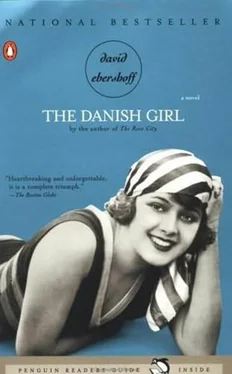“I was just on my way back to the hotel,” Greta said as Professor Bolk took one end of the canvas and rolled it up like a window shade.
“You must be planning quite a large painting,” he said.
But that wasn’t the case. At that moment Greta didn’t know what she wanted to paint next; it didn’t seem the right time to paint Lili.
“Can you walk me back to my hotel?” Greta said, pointing to the park of chestnut trees in front of the Bellevue, which sat like a squarely built lifeguard in his stilted chair cockily surveying the beach of the Elbe.
“I’d like to hear about the operation,” she said. “About Lili’s prospects.” Over the past few days she’d begun to sense that Professor Bolk had been avoiding her; two days she’d been in Dresden, and he still hadn’t replied to the inquiries she left at Frau Krebs’s desk. She even mentioned to Ursula that she wanted Professor Bolk to phone. But he never came to see her. Now she led him to her suite at the Bellevue. They settled into the chairs by the window, drinking coffee brought by a maid with a strip of lace pinned to her hair.
“The first operation was a success,” Professor Bolk began. “It was rather simple. The incision is healing as it should.” He told Greta about the surgery in the operating amphitheater, where before dawn one morning Einar had become Lili. He explained that the systematic tests-the blood counts and the urinalysis and the hourly monitoring of Lili’s temperature-were all showing signs of proper healing. The Listerian antisepsis was protecting Lili from infection. “The biggest concern right now is the pain,” Professor Bolk said.
“What are you doing about that?”
“A daily morphia injection.”
“Is there any risk to that?”
“Very little,” he said. “We’ll wean her off it over the next several weeks. But right now she needs it.”
“I see.” Now that she had Bolk at her side, her concern about him faded. He was no different from most busy, important men: impossible to track down, but once you had him his full attention was yours.
“I was concerned about her bleeding,” Professor Bolk continued. “She shouldn’t have been hemorrhaging like that. It made me think something was wrong with one of her abdominal organs.”
“Like what?”
“I didn’t know. A crushed spleen. A hole in the lining of the intestine. Anything was possible.” He crossed his legs. Greta could feel her heart quicken as she became frightened for Lili.
“She’s all right, isn’t she? I shouldn’t be worried about her, should I?”
“I opened her up,” Bolk said.
“What do you mean?”
“I opened up her abdomen. I knew something was wrong. I’d been in enough abdominal cavities to know something was wrong.”
For an instant Greta shut her eyes, and she saw, on the backs of her lids, a scalpel drawing a line of blood across Lili’s belly. She had to stop herself from imagining Professor Bolk’s hands, with the help of Frau Krebs, pulling apart the incision.
“It’s true that Einar was indeed female. Or at least part female.”
“But I already knew that,” Greta said.
“No. I don’t think you understand.” He snatched a star-shaped sugar cookie from the tray brought by the maid. “It’s something else. Something rather remarkable.” His eyes were bright with interest, and Greta could tell he was the type of doctor who wanted something-a disease, a surgical procedure-named after him.
“In his abdomen,” Bolk continued, “tangled in with his intestine, I found something.” Dr. Bolk folded his hands together and cracked his knuckles. “I found a pair of ovaries. Underdeveloped, of course. Small, of course. But they were there.”
Greta decided at that moment that she should paint Professor Bolk: the square line of his shoulders; his hanging arms; the long neck emerging from a starched collar; the skin around his eyes crinkled and tender. She sat back in her chair. An opera singer was staying in the suite next door, and Greta could hear her singing Erda from Siegfried : the rolling middle register; the voice swooping through the air like a hunting hawk. The voice sounded like Anna’s, but that was impossible, because Anna was in Copenhagen, singing at the Royal Theatre again for the first time in years. When Lili was feeling better, Greta thought, she would like to take her to the opera, and she imagined them holding hands in the dark of the Semperoper while Siegfried made his way to Brünnhilde’s fire-rimmed mountaintop.
“What does it mean for her?” Greta finally asked. “Are these ovaries real?”
“It means I’m even more certain that this will work.” And then, “We’re doing the right thing.”
“You really think this explains the hemorrhaging, then?”
“Probably,” he said, his voice rising. “It explains almost everything.”
No, Greta thought; she knew the ovaries couldn’t explain everything.
“There’s a grafting process I want to try,” Professor Bolk went on. “From a healthy pair of ovaries. It’s been done with testicles but never with the female organs. But there have been results.
“I’d like to harvest some tissue from a healthy pair of ovaries and layer it over Lili’s,” he said. “But it’s a matter of timing. A matter of finding the right pair.”
“How long will that take?” And then, “Are you sure you can do this?”
“Not so long. I have a girl in mind.”
“From the clinic?”
“There’s a young girl from Berlin. We thought she was pregnant when she arrived. But it turns out a tumor has taken over her stomach.” He stood to leave. “She doesn’t know, of course. What would be the point of telling her now? But she might be the one. It might be only a month or so.” He shook Greta’s hand. When he was gone, Greta opened her double-lid paint box and began to set out the bottles and lay down a tarp, and then, through the walls, came the opera singer’s voice, slow and dark and climbing the notes alone.
Several weeks later Greta and Lili were sitting in the clinic’s garden. The birch trees and the willows were shiny with buds. The hedges were still patchy, but dandelions had sprung up in the brick path. Two gardeners were digging holes for a row of cherry trees, burlap bags bundling their roots. The gooseberry shrubs were beginning to leaf.
A circle of pregnant girls was on the lawn, on a tartan blanket, weaving blades of grass. Their white hospital gowns, loose in the shoulders, were trembling in the wind. The clock in the clinic’s eaves was striking noon.
A cloud shifted, and the lawn turned nearly black beneath the shadow. The cherry trees blew over, and a figure emerged from the clinic’s glass door. Greta couldn’t tell who it was. He was wearing a white lab coat, which was flapping like the pennants strung along the tourist cruiser that was plying the Elbe.
“Look,” Lili said. “It’s the professor.”
He moved in their direction, and the cloud shifted again, and Professor Bolk’s face lit up, the sun on his spectacles. When he reached them he knelt down and said, “It’s going to be tomorrow.”
“What is?” Lili asked.
“Your next operation.”
“But why all of a sudden?” Lili asked.
“Because we’re ready with the graft tissue. We should operate tomorrow.” Greta had told Lili about the next procedure, about the ovarian tissue that Professor Bolk would lay into her abdomen.
“I expect everything to go as planned,” the professor said. In the sunlight the skin in Bolk’s face was thin, the sea-color of his veins showing through. Greta wished Hans had traveled to Dresden with her. She’d talk it over with him; she’d like his counsel-the way he’d tent his fingers together in front of his mouth as he thought through a situation. Greta suddenly felt exhausted.
Читать дальше












